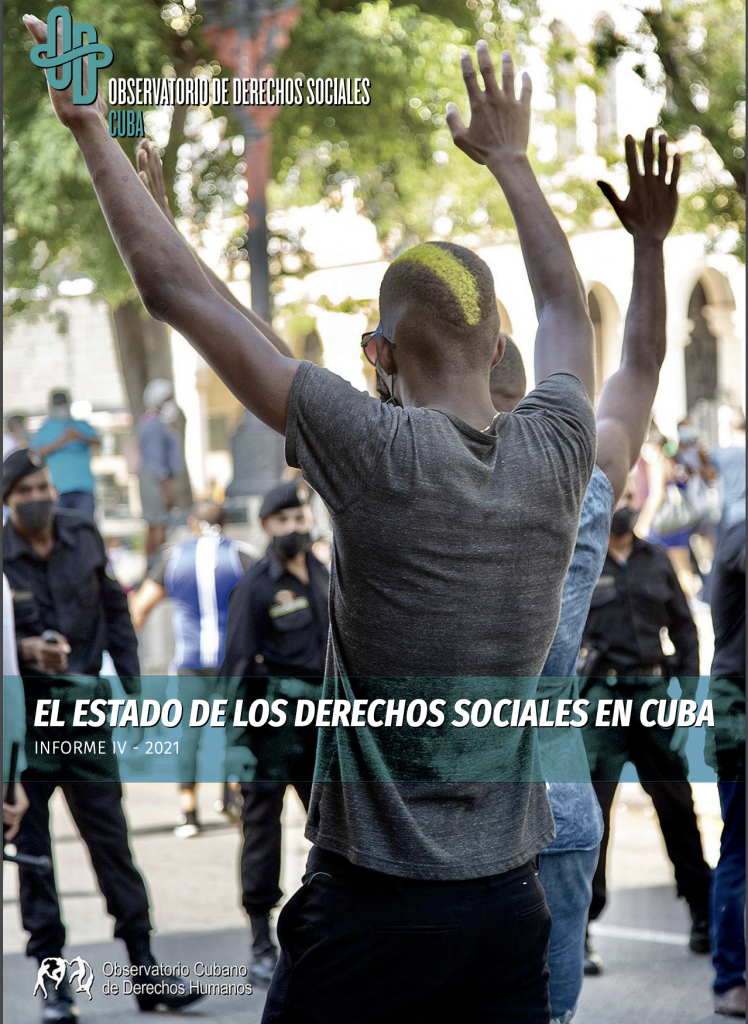
![]() 14ymedio, Madrid, 27 September 2021 — Food shortages continue to be the main problem for most Cubans, followed by covid-19 and the economic consequences caused by the ‘Ordering Task’*. This data is presented by the Cuban Observatory for Human Rights (OCDH) in its fourth report on The State of Social Rights in Cuba, presented this Monday in Madrid, which notes that for 60% of the island’s population the most important issue is the food crisis.
14ymedio, Madrid, 27 September 2021 — Food shortages continue to be the main problem for most Cubans, followed by covid-19 and the economic consequences caused by the ‘Ordering Task’*. This data is presented by the Cuban Observatory for Human Rights (OCDH) in its fourth report on The State of Social Rights in Cuba, presented this Monday in Madrid, which notes that for 60% of the island’s population the most important issue is the food crisis.
No less than 71% of Cuban families live on less than $3.80 USD per day. This means, according to the OCDH, that “in a three-member household (the average norm in Cuba), each person survives on less than $1.28 a day,” which places millions of Cubans “below the threshold of poverty, according to World Bank standards ($1.90 a day).”
During 2021, 45% of Cubans claim to have deprived of at least one meal a day, while 73% rate their family’s diet as “deficient,” six points higher than last year. For the majority of respondents (56%), the food they are eligible to buy through the ration book only lasts five or ten days a month.
Among the concerns of the island’s inhabitants, the health crisis is the second most critical area (59% consider it the main problem). The OCDH survey indicates that 79% of Cubans rate government action in this regard as fair to very bad.
Eight out of every ten Cubans admit not having been able to get medicines in pharmacies, mainly due to shortages (29%); 24% got them “by other means” and 14% were able to obtain them thanks to shipments from abroad.
“Although the official propaganda boasts of providing free public health care for all,” says the Madrid-based organization, “43% of those surveyed affirm that they themselves or a close relative have had to pay or give something [of value] to health professionals to access or expedite any consultation or service.”
In addition, 21% say that their family’s health status has worsened, 20% indicate that they have taken expired medicines and 15% have bartered items for medicines.
The third most cited problem in the Observatory survey, at 29%, are the effects of the so-called ‘Ordering Task’*, in force since the beginning of 2021, through which the Government “feigned a monetary unification and raised wages and prices,” notes the OCDH.
Another striking figure is that 80% of those who responded to the study have suffered power cuts in the last three months and 82% affirm that they do not have permanent drinking water service in their homes.
“In addition to the clamor for freedom, the growing deterioration of social rights was one of the causes of the civic protests in July and is at the base of the political change that millions of Cubans want or demand,” said Yaxys Cires, director of Strategy of the Observatory, referring to the 11 July protests. “The social outbreak made obvious to all eyes the fallacy of the propaganda idea that Cuba is the paradise of social rights.”
In a new feature, just over a month before the planned total reopening of tourism in Cuba, the study delves into the working conditions in this sector. The majority (55%) answered that there is “discrimination of some kind,” 72% of them consider that it is mainly due to political ideas. Lack of influence (36%), sexual orientation (33%) or being part of an independent civic organization (32%) are also pointed out as causes of segregation.
In fact, 54% believe that there is more political and ideological control in this labor sector.
The field work was carried out in 11 provinces throughout the island and is based on a total of 1,141 personal interviews conducted between June 25 and July 19.
“Cuba’s problem is the system as a whole, which affects all aspects of the country’s life,” Cires said. “This merits a process of urgent and profound changes in the economic, social and political spheres. In fact, in a less demanding vision, it would be possible to propose the resignation of the full Council of Ministers, due to the immobility and little empathy with the people, due to the failure of the Ordering Task and the disastrous management of public health, understood not only as its collapse during the pandemic, but also due to its accumulated deterioration.”

*Translator’s note: Tarea ordenamiento = the [so-called] ‘Ordering Task’ which is a collection of measures that includes eliminating the Cuban Convertible Peso (CUC), leaving the Cuban peso as the only national currency, raising prices, raising salaries (but not as much as prices), opening stores that take payment only in hard currency which must be in the form of specially issued pre-paid debit cards, and other measures throughout the economy.
____________
COLLABORATE WITH OUR WORK: The 14ymedio team is committed to practicing serious journalism that reflects Cuba’s reality in all its depth. Thank you for joining us on this long journey. We invite you to continue supporting us by becoming a member of 14ymedio now. Together we can continue transforming journalism in Cuba.
